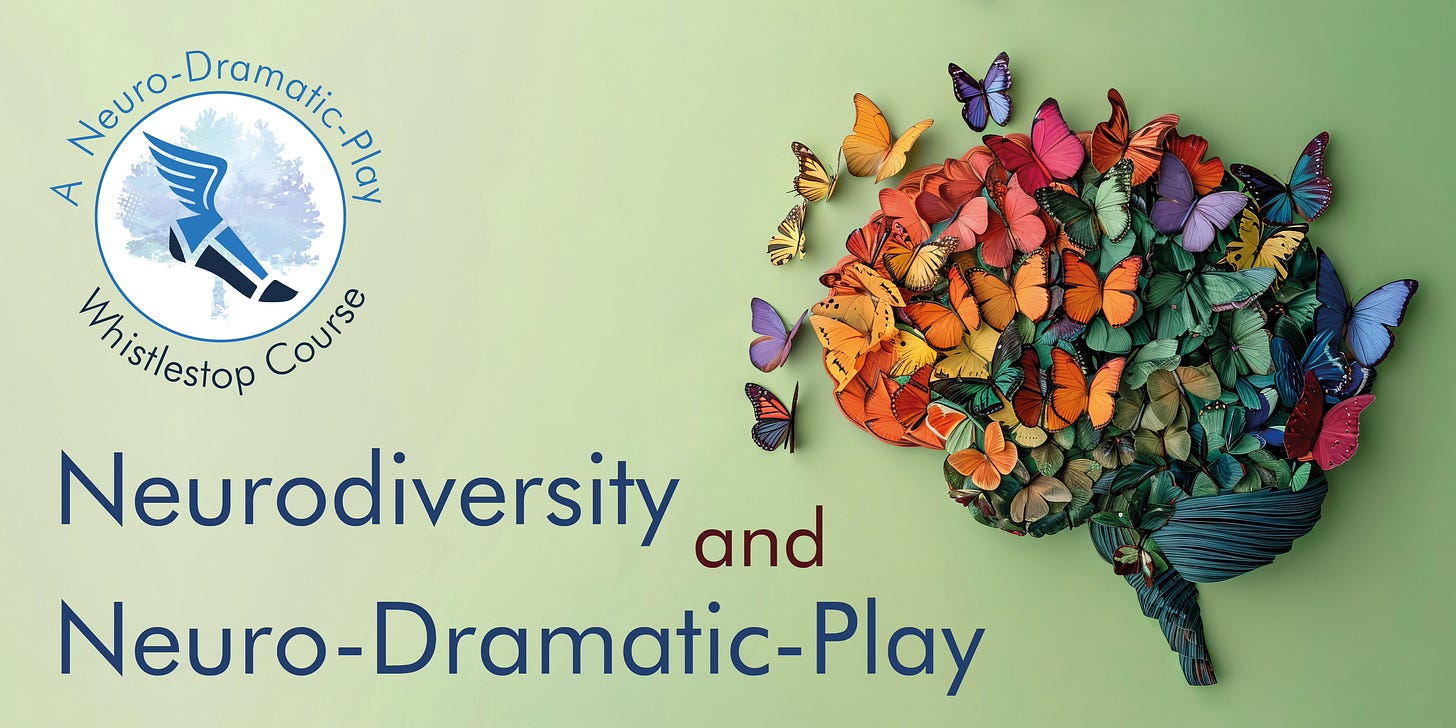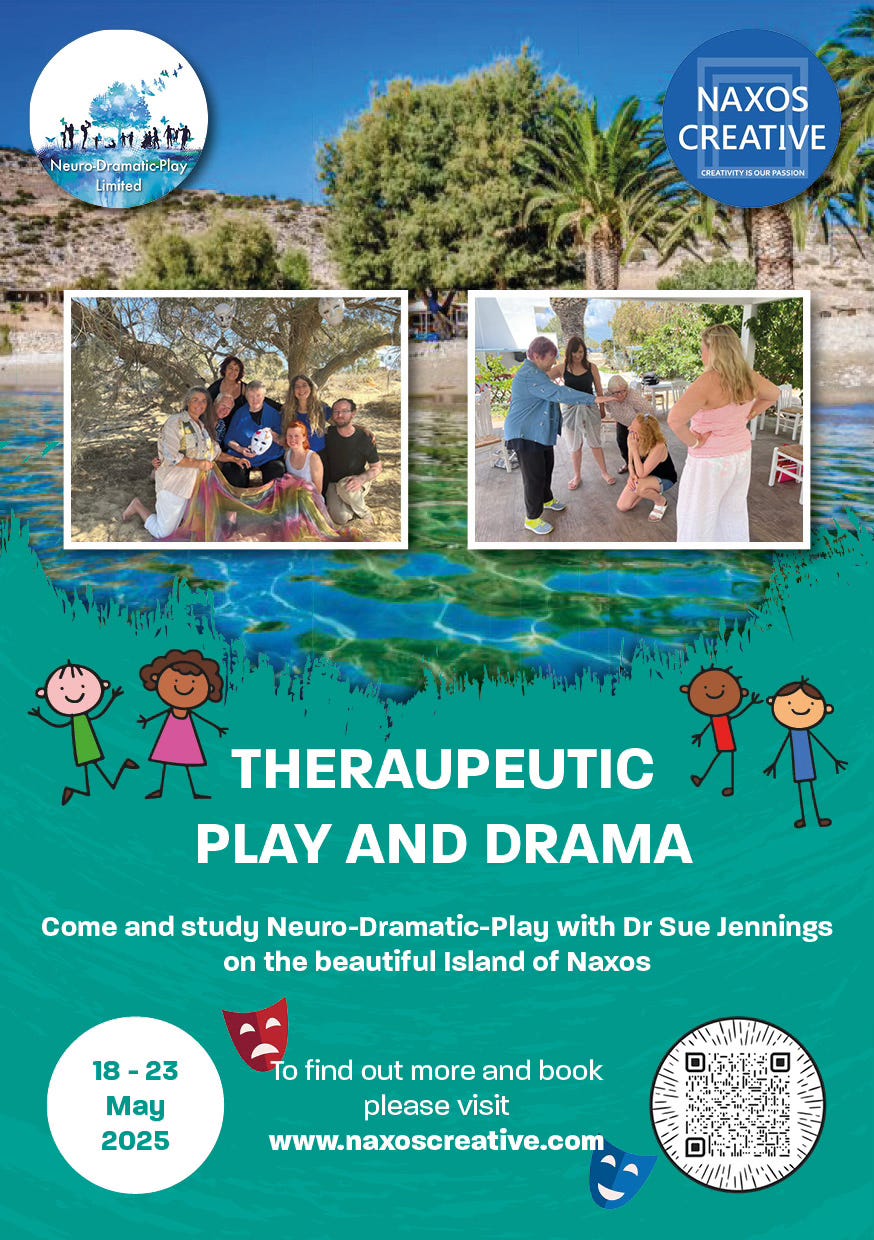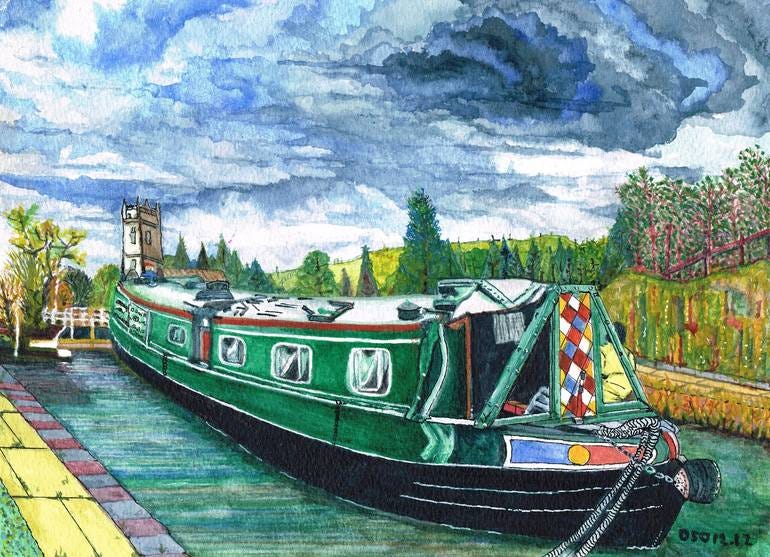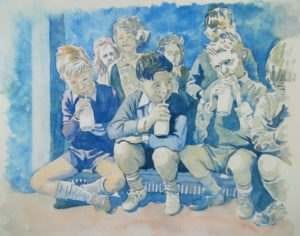Dear all,
Well, I really had enough of the wet and the wind in the UK, so it was a pleasure to leave it all behind and head for Naxos, ready for the week of NDP. We shall steep ourselves in the story of Ariadne, and other tales linked to it, and have time to dance and play on the sand. Our neighbourhood Taverna gave us such a lovely welcome back. Now to get the brown paper for making huge puppets and the plain masks to develop our own creativity. There are so many aspects to the stories of Ariadne that give us amazing resources for working with many different types of groups. We include adults and elderly people, and teenagers and older children who enjoy the spirit of adventure and ‘setting sail’.
Thank you so much for being a part of my network – it feels as if I have lots of friends who are willing to hear about new ideas and contribute their own.
With love,
Dr Sue
Announcing: An exciting new innovative course!
Be the first to know! We are starting an innovation in our webinars. The changes are based on feedback from yourselves, which is why ‘consumer response’ is so essential. Thank you to everyone who has given feedback and made suggestions. The result is what we have called our ‘whistlestop’ courses.
These NDP Whistlestop Courses are a new training package for care workers, teachers, parents and therapists which aims to be informative, accessible and affordable. The courses will be offered at flexible times in order to fit in with people’s existing commitments. The courses are 2 hours long and cost only £45!
Each programme consists of:
A presentation of the course theory and practice (available for participants after the course
A practical workshop with take-away skills
Times for questions, concerns and discussion
Therapeutic stories relevant to the course
Participants will receive detailed notes and therapeutic stories before the course, and the Power Point and CPD Certificate after the course is completed.
The first of these new courses is titled Neurodiversity and Neuro-Dramatic-Play. This course emphasises and develops what neurodiverse children and young people can do, and helps to build confidence and self-esteem. It is common for people to set low expectations for neurodiverse people, or set them impossibly high; and because there is so much variation, we don’t always get it right.
Creativity and playfulness allow us to have a level playing field, and by developing the capacity to play, we can set the foundations for building skills of analytic thought and creative composition. Everything starts with the body which then communicates to the brain.
Come and join this exciting new course! Click on the button below to learn more and book via Eventbrite:
NDP and forms of Play
We have discussed the basics of NDP in previous Newsletters, namely:
Water Play, Rhythmic Play, Messy Play and Dramatic Play. Although water play probably starts it all off, these contrasting play-forms start and interact with each other, rather than following a developmental pathway.
“Rhythmic play usually gives safety and security, and messy play is the adventure for the curious!” (Jennings 2024)
There in the background is the steady heartbeat, slowing down at night, speeding up again. Alerting us to danger when it beats really fast, calming us down when it slows to a gentle pulse, influenced by our breathing. One reason that bubble blowing can be helpful during any fear episodes, is that you need a deep, slow breath to make the bubbles happen.
Rhythmic Play: so we are calm with our heartbeats, and we are rocked in arms or cradles: I wonder why cradles and rocking chairs became things of the past – any thoughts?
Performative Play is still my preoccupation as I undertake observations with mothers and other dominant attachment figures with infants, especially during the first six months: adult and infant are living life through each other. This core of the attachment development needs 100% attention in the first six months, longer if possible. Perhaps we need to re-think attachment training for therapists, teachers, care workers and parents to include all of neuro-dramatic-play (NDP), and performative play in particular.
Small children are encouraged to ‘perform’ by their parents for grandparents and other relatives, or ‘show off’ their skills and accomplishments to friends and neighbours. However that soon changes into ‘stop showing off’, or ‘just calm down’, or ‘children should be seen and not heard’.
This is very confusing to the developing child and can undermine their confidence and self-esteem. It may result in children avoiding the drama and dance classes and choosing the simplest musical instrument. Drama, dance and music are all performative arts, which is the same in arts therapies. This fear of performance, of having to stand up in front of other people, goes very deep. One client who was being encouraged to join group therapy, cringed and said, ‘What, having to stand up in front of all those people, like in Alcoholics Anonymous’; and nothing could persuade him that it would be any different.
We need to be aware that the performative partner after the birth, may be different from the one during the pregnancy, when babies are removed at birth for immediate adoption or foster care. The voice, expression, holding, and smell will all be different, and to my knowledge there has been no research in this area. However, we can help adoptive and foster parents to acquire the performative play skills that will help the new attachment relationships. We can also remind them of the performative stages: peek-a-boo, pat-a-cake and dancing on the lap.
It might also be helpful to find out if they have any performance anxieties that might prevent them from enjoying the performative relationship to the full.
I continue to quote the interaction and role reversal between Polly Garter and her newborn baby in Under Milk Wood, by Dylan Thomas. Even the name of the play focusses on milk! The line in bold is Polly answering herself ‘as if’ she is the baby.
‘Me, Polly Garter, under the washing line, giving the breast in the garden to my bonny new baby. Nothing grows in our garden, only washing. And babies. And where’s their fathers live, my love? Over the hills and far away. You’re looking up at me now. I know what you’re thinking, you poor little milky creature. You’re thinking, you’re no better than you should be, Polly, and that’s good enough for me. Oh, isn’t life a terrible thing, thank God?’
Plenty to think about!
With love,
Dr Sue
Bits & Bobs
Studying NDP: remember there are several ways to gain a Diploma in NDP. You can spread the training over several months by studying at week-ends OR you can apply for the ‘Self-Guide’ course, and study all of it in your own time and at your own pace. Find out more by clicking the button below.
OR you can come to Naxos in mid-May 2025, and spend a week on this idyllic island, playing on the beach and in the shallows. Studying NDP on Naxos is a unique experience! To be able to learn attachment-based play in a playful environment satisfies our basic needs! It provides a break from our usual routines, together with learning something new! There is also time to explore Naxos itself with well looked-after historic buildings, quaint shops and a bounty of associated myths. All the Tavernas I have tried have been exemplary in their cooking and cleanliness!
Watch this space! We shall shortly be announcing the ‘NDP Student of the Year’, which is awarded to someone who has consistently shown a high standard in their assessments, course work and workshops.
Just a little nudge – please consider becoming a paid subscriber – not only does it help me as a writer – you also gain more, with additional article, stories and techniques, 4 free webinars each year, and 10% discount on any UK training. As a paid subscriber you are supporting new things that I am creating and are closely involved in the process. Just £65 per year or monthly instalments. Thanks and a hug. De-luxe membership is £120 per year and gives free monthly consultations, 6 free webinars per year and 15% off UK training.
And finally, our bed-time story. This time it is the next section from our story about life at a rural school after WW2.
Miss Penny-Weather’s Country School
The Story of Jimmy Swift, the Boy from Somerset:
Miss Penny-Weather’s Country School story is based on events that the author experienced or that she heard about as a child in post-war Britain. It creates the atmosphere of the rural school and is a useful addition to lessons about social history. It will be published as a book later this year.
Episode 8
Jimmy took his place next to Miss Penny-Weather and smiled. He said, ‘It is really important that I learn to read,’ – he paused for a moment, ‘because my Mum and Dad can’t read!’ He waited for a shocked reaction from the teacher, but she smiled and said, ‘Lots of grown-ups never learned to read. When they were young, they had to work, so small children were working on farms or helping to sweep chimneys, so they never went to school’. Jimmy looked surprised but didn’t say anything, as he could see Miss Penny-Weather had more to say. She went on, ‘And probably your grandfathers lived when poorer people were not allowed to learn reading and writing, and had to sign their name with an X’. ‘Why would you stop someone learning?’ said Jimmy, in complete surprise. ‘Well’, said the teacher, ‘it is very complicated, and one day, when you can read easily, you can read all about it. But for now, just understand that bosses don’t like their workers to be educated, because then they will have knowledge, and knowledge can be dangerous thing!’
Jimmy tried to understand why knowledge could be dangerous, but it was beyond him. He took out his homework from his school bag, and the teacher gave green ticks to all the letters he had copied and the very simple sums he had added up. She wrote, Well done, neat writing and correct sums, and then read him what she had written. Jimmy glowed and was very pleased that he had got it right. He also told her that he could stay all day today, as his parents would wait beyond the locks, until the school day had finished.
Miss Penny-Weather was very pleased, and thought that Jimmy might make headway rather faster in reading and writing. However, she knew he really had an aptitude for maths, and she wanted him to progress so that he could be on a level with other children his age. Also she was curious and said to Jimmy, ‘I see you are making friends with young Mathew.’ ‘Yes,’ said Jimmy, ‘He’s a good mate,’ thinking it wise to say no more, at least for the time being.
Jimmy made good progress with simple reading and Miss Penny-Weather gave him some more sums, and to practise writing letters for homework. Then it was milk time and Mathew and Jimmy both had extra, as there were some bottles left over. They clinked their bottles together as if making a toast, and then laughed. It was the sealing of a friendship.
Breaktime was over and it was modelling time. Miss Penny-Weather said the older children had to work with a partner and they were both delighted when Jimmy and Mathew were a pair. The smaller children played with the Plasticine on their own, but the older children had to make model – and this time it was – A Theatre. What’s a theatre?’ whispered Jimmy. ‘Don’t worry, I will show you’, said Mathew. Jimmy noticed that Mathew cheered up as soon as they started to talk about their project – what did modelling a theatre mean?
Let’s find out in the next episode!
(If you prefer to listen to these stories, they will shortly be available on YouTube ‘NDP Storytime with Sue Jennings’ and ‘Stories of Mouse and Mouse’. The ‘Moose and Mouse’ stories are available in the paid section and are written for children under the age of 6 years. They address important issues in child development such as attachment, loss, playfulness, adventure, safety and fears. See our website here.)
Welcome to our Subscribers’ exclusive area with more news items, resources, stories and more. If you can’t see what’s below then please do subscribe and join us!
Dear Friends and Colleagues,
Well, the positive effects of the holidays soon fade away as we return to face more cuts, reduced staffing levels and unimaginable wars abroad.
Keep reading with a 7-day free trial
Subscribe to Sue Jennings Presents to keep reading this post and get 7 days of free access to the full post archives.











